

The Future According To Films. 101 Sci-Fi Adventures. Image from John Hilgart’s 4CP archive Recently, I compiled a list of two hundred of my favorite adventures published before the Eighties (1984–93).
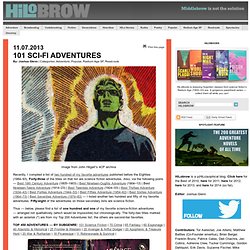
The Top 101 Science Fiction Adventures. I was thinking about that, but... what about The Lost World doesn't qualify as science fiction, given the time in which it was written?
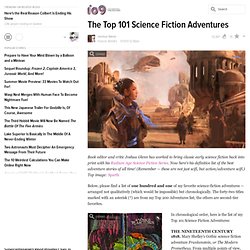
Paleontology and biology (whether you're talking about studying the remains of dinosaurs or living dinosaurs) are sciences, and exploration (including the discovery of new species, or the discovery of still-living previously-thought-extinct species) is about science. It's still speculative fiction with a scientific premise (even if that premise has a thick gloss of pulp adventure), even though we now regard it as fantastical. But it's a reminder that "science" encompasses more than just space and lasers. While paleontology and biology are both sciences, discovering dinosaurs in a jungle is fantasy. The difference lies in that they were not created through science nor was anything else. Having a critter, saying that its part of biology, and therefore science doesn't fly. Studs Terkel and Calvin Trillin Talk To SF Writers. Accidental find shows Vitamin C kills tuberculosis. Accidental find shows Vitamin C kills tuberculosis (AFP) – 18 hours ago PARIS — Scientists said Tuesday they had managed to kill lab-grown tuberculosis (TB) bacteria with good old Vitamin C -- an "unexpected" discovery they hope will lead to better, cheaper drugs.
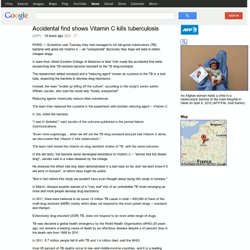
A team from Albert Einstein College of Medicine in New York made the accidental find while researching how TB bacteria become resistant to the TB drug isoniazid. The researchers added isoniazid and a "reducing agent" known as cysteine to the TB in a test tube, expecting the bacteria to develop drug resistance. Instead, the team "ended up killing off the culture", according to the study's senior author William Jacobs, who said the result was "totally unexpected".
Reducing agents chemically reduce other substances. 10 Science Fiction Novels You Pretend to Have Read (And Why You Should Actually Read Them) More Science Fiction for Economists (Seriously Time-Wasting) Noah Smith has a list; all good stuff, although not all to my taste.
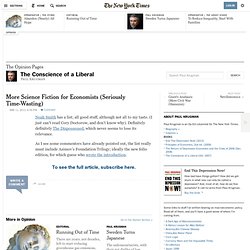
(I just can’t read Cory Doctorow, and don’t know why). Definitely definitely The Dispossessed, which never seems to lose its relevance. As I see some commenters have already pointed out, the list really must include Asimov’s Foundation Trilogy; ideally the new folio edition, for which guess who wrote the introduction. I absolutely second (and third, and fourth) Charlie Stross. But Accelerando, although great, isn’t my top pick.
Neal Stephenson: Actually, The Diamond Age is closest to being an econonovel. First trailer for Elysium proves that Neill Blomkamp's still got it. Hopefully it will be as nuanced as 90 to 120 minutes and Hollywood focus groups will allow it to be.

The Immortal Life of Henrietta Lacks, the Sequel. Charting the futures of science fiction. Everyone who reads science fiction can probably name some of the movements and fads that have come and gone in the last century.
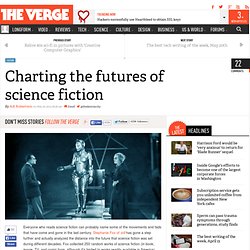
Stephanie Fox of io9 has gone a step further and actually analyzed the distance into the future that science fiction was set during different decades. Fox collected 250 random works of science fiction (in book, movie, TV, and comic form, although it's limited to works readily available in America) created between 1880 and 2010, then charted roughly how far into the future they appeared. Pieces are divided into three categories. Near-future works, set up to 50 years in the future, are typified by books like 1984 and Neuromancer.
Mid-future works are set up to 500 years ahead, presenting new societies or tech but characters who are recognizably like us. Science, Technology and the Environment. You Must Watch These Spectacular Chemical Reactions Because... Because They Are Bloody Fun. N1ON. Christopher Priest, author. Just back from an appearance at the Sunday Times Oxford Literary Festival, in the preternaturally warm March weather.
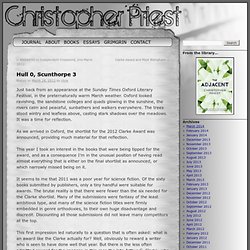
Oxford looked ravishing, the sandstone colleges and quads glowing in the sunshine, the rivers calm and peaceful, sunbathers and walkers everywhere. A science fictional map of San Francisco as an archipelago city. Science Fiction for Young Adults: A Recommended List - David Brin. What books can we give our teens that don't mire them in a swamp of vampires, domineering wizards or nostalgia for feudalism?
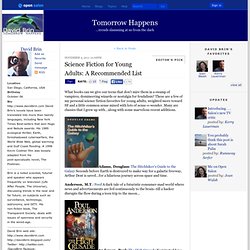
These are a few of my personal science fiction favorites for young adults, weighted more toward SF and a little common sense mixed with lots of sense-o-wonder. Many are classics that I grew up with...along with some marvelous recent additions. How Not to Be a Clever Writer. What does science fiction tell us about the future of reproductive rights? " There was a creepy subplot on Battlestar Galactica where Starbuck is captured by the Cylons, forcibly impregnated, and was later forced to live as the "wife" of the Cylon Leoben.
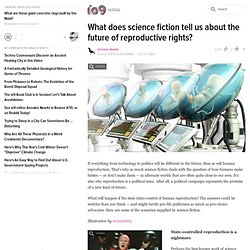
" Wait, wait, what? That never happened. Announcing Arc: a new magazine about the future from the makers of New Scientist.